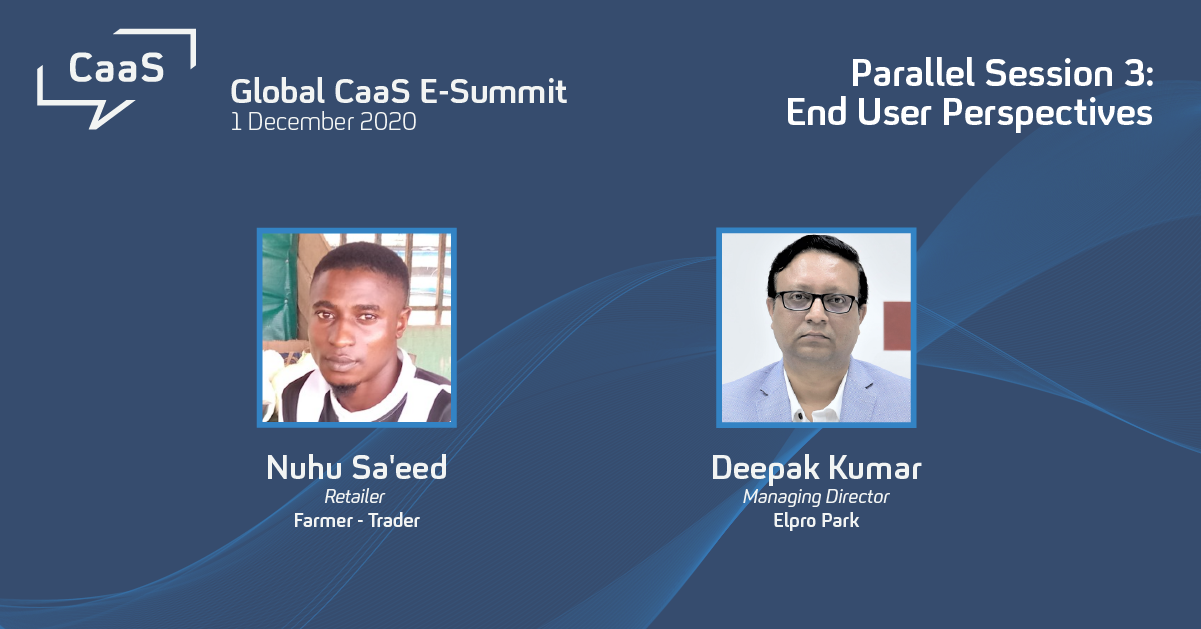CaaS meets the needs of users in India and Nigeria

During the Global Cooling as a Service (CaaS) E-Summit, attendees heard how vastly different implementations of CaaS have resulted in highly satisfied users with improved day-to-day experiences.
On Tuesday, December 1, the Switzerland-based Basel Agency for Sustainable Energy (BASE) hosted the Cooling-as-a-Service Global E-Summit. The day featured stories from investors as well as providers and users of CaaS from around the world. The first end-user session of the day shared two very different perspectives on the direct impact of CaaS for end-users. Deepak Kumar, the Chairman and Managing Director of Elpro International, represented an Indian company with diverse holdings including real estate, while 23-year-old Nuhu Sa’eed shared his view as a farmer and trader from an outdoor food market in Nigeria.
Air Conditioning in India
Kumar has been using air conditioning as a service provided by Kaer, a pioneer in CaaS, in an office park which contains two office buildings, a school, and a shopping mall.
Located in Pune, India, 130km (80mi.) from Mumbai, the commercial development required air conditioning to tackle the extreme temperatures of the region. The Kaer plant, built on site, provides this using the CaaS servitization model.
According to Kumar, his company was looking to meet three main requirements when evaluating the use of CaaS: having a good provider, not being locked in a contract, and a positive cost comparison to conventional air conditioning.
Kaer met these requirements by providing optimal service and reliability, having a simple pay-per-use model with a simple bill that allows Kumar’s company to focus on its main business, and by running on 100% renewable energy from solar power, the installation is also sustainable.
For Kumar, providing clean air and a healthy environment in a sustainable manner was important. “We found the commercial terms to be very amiable,” said Kumar. “When you see the contract is transparent, it builds trust and creates a win-win for the provider and customer.”
The pay-per-use model was especially welcome during the COVID-19 pandemic, according to Kumar, who highlighted that the office building and school did not have to pay for the service when they were forced to shut.
In the past, inefficient, air-chilled systems were being used. Not only do these consume large amounts of power, but they also require the real estate owners to hire a team to manage and maintain the system itself, all problems that were removed by using Kaer with CaaS.
Cold Storage in Nigeria
Located in Imo State, Nigeria, the farmers/traders selling at Onize Vegetable Market had problems with spoiled produce. According to Sa’eed, they often had to toss out 50% of the produce set to sale, leaving them only marginal profits. Since the installation of a pay-per-use cold storage unit by ColdHubs at the market, only 1-5% of the produce spoils, leaving the users with much higher profit margins.
“Before we used to get a lot of loss, because things would spoil in the market,” said Sa’eed. “We used to lose a lot of money, now it’s only 5% or 10%.”
Sa’eed, who typically sells cabbage, carrots, spring onions, lettuce, onion, celery, parsley, lemons and more, recounts how he was surprised by the arrival of the ColdHubs facility. In August, ColdHubs was named by BASE as the winner of the Cooling as a Service Prize, which recognizes outstanding providers of refrigeration and air-conditioning equipment financed by the CaaS business model in developing countries.
After giving it a try, he saw the benefits in not only preserving the produce he had, but it also allowed him to buy several bags of produce in bulk (two to five times more than before), merge this with what he grows himself, and store it in the facility to prevent spoilage, greatly increasing his profit margin.
Each crate stored has a number, which is then kept track of in a paper card provided by ColdHubs. The storage of a crate per night is 100 Naira (US$0.27), a sliver of the cost of produce which can cost 20,000 Naira (US$53) for green peppers, for example.

Watch this end user panel
The Global CaaS E-Summit platform will stay online as a virtual library for a whole year. Simply log back into the event and watch whichever session you choose. It is also possible to register post-event, so feel free to share the link with your colleagues and/or customers – new participants can use the code “CaaS!” to access the platform.